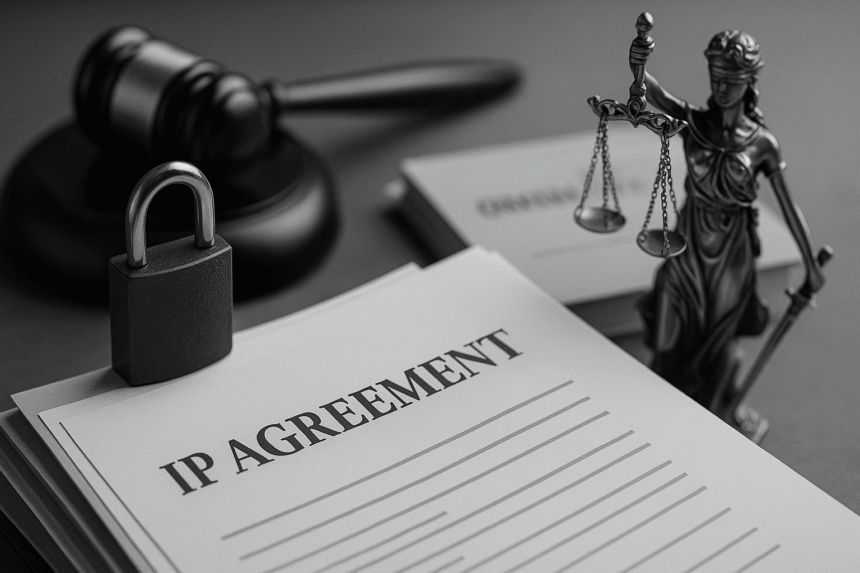Table of Contents
ToggleHow to Protect Business Ideas Through IP Agreements
Why Every Founder Needs More Than Just a Great Idea
Introduction: “Ideas Are Easy—Protection Isn’t”
Every business begins with an idea. It could be a unique app concept, a disruptive supply chain model, or a clever brand slogan. But here’s the brutal truth—ideas alone aren’t enough. What separates the visionary founder from the forgotten one is not the originality of the idea, but how well it’s protected.
If you’ve ever launched a pitch deck or discussed a prototype with a freelancer or investor, and later seen something eerily similar appear elsewhere, you’ve felt that sting. You wonder: Can I stop them? Did I do enough to protect myself?
This article shows how to protect business ideas through IP agreements—and why doing so is essential, not optional. We’ll explore common mistakes, clarify your legal tools, and outline a proactive protection strategy.
What Most People Get Wrong About IP Protection
Many startup founders or solo consultants assume that their “good relationships” are enough to protect business ideas through IP agreements or informal understandings. There’s a belief that NDAs are for the paranoid or that email trails offer enough legal coverage.
But trust isn’t a legal strategy.
Disputes often arise not from theft but from unclear expectations. A friend you brainstormed with becomes a competitor. A developer reuses your code. An investor leaks your strategy.
By the time you realize it, you’re not protecting your business—you’re reacting to its exposure.
Why I Believe in “Agreements First, Everything Else Second”
Let me share a story. I once worked with a founder who casually discussed his SaaS idea with a former classmate. There was no NDA. No IP assignment. Six months later, a similar product launched—by the classmate.
Had the founder taken steps to protect business ideas through IP agreements, he would’ve had legal standing and leverage.
That’s why I say: drafting the right IP agreements isn’t paranoia—it’s professionalism.
5 Agreements That Protect Business Ideas Through IP Agreements
If you’re serious about your business, here are five legal documents that will help you protect business ideas through IP agreements:
1. Non-Disclosure Agreement (NDA)
Purpose: Prevents the misuse of confidential information.
NDAs are the first line of defense to protect business ideas through IP agreements, especially when dealing with investors, freelancers, or partners.
2. IP Assignment Agreement
Purpose: Transfers ownership of IP from creators (developers, designers) to your business.
This agreement is critical to protect business ideas through IP agreements when outsourcing creative or technical work.
3. Employment or Contractor Agreement with IP Clauses
Purpose: Ensures anything created by your team belongs to the business.
Without it, freelancers could legally own the code, branding, or product features they build. These contracts directly protect business ideas through IP agreements from ambiguity in ownership.
4. Co-Founder Agreement
Purpose: Clarifies IP ownership among founders.
This is vital to protect business ideas through IP agreements when multiple people are contributing ideas or assets to the company. It also avoids future disputes over “who owns what.”
5. Licensing Agreement
Purpose: Grants controlled usage rights to others without giving away your IP.
When you’re ready to monetize but want to maintain ownership, a licensing agreement helps you protect business ideas through IP agreements while enabling scale.
Real-Life Example: The “Pitch Deck Leak”
A legal consultant I worked with pitched a niche idea to a tech accelerator—no NDA, no copyright, no protection. A similar concept later appeared in their portfolio.
If she had taken the time to protect business ideas through IP agreements, she would’ve had legal recourse. Instead, she was left with frustration and regret.
Common Pushback: “Why Not Just File a Patent?”
Patents and trademarks are important—but they take time and money. Meanwhile, IP agreements are immediate, enforceable, and cost-effective. They allow you to protect business ideas through IP agreements from day one.
Think of formal registrations as armor—but IP agreements are your seatbelt. You need both, but start with what you can implement immediately.
Final Thoughts: The Time to Protect Is Before, Not After
If your idea is real enough to pitch, it’s real enough to protect.
You don’t need a full legal department to protect business ideas through IP agreements—just a willingness to act before problems arise. Each agreement you implement creates a safety net for your creativity, strategy, and growth.
Call to Action:
Need expert help to protect business ideas through IP agreements?
Book a strategy call or download our free IP Agreements Checklist to get started.



Leave a Reply